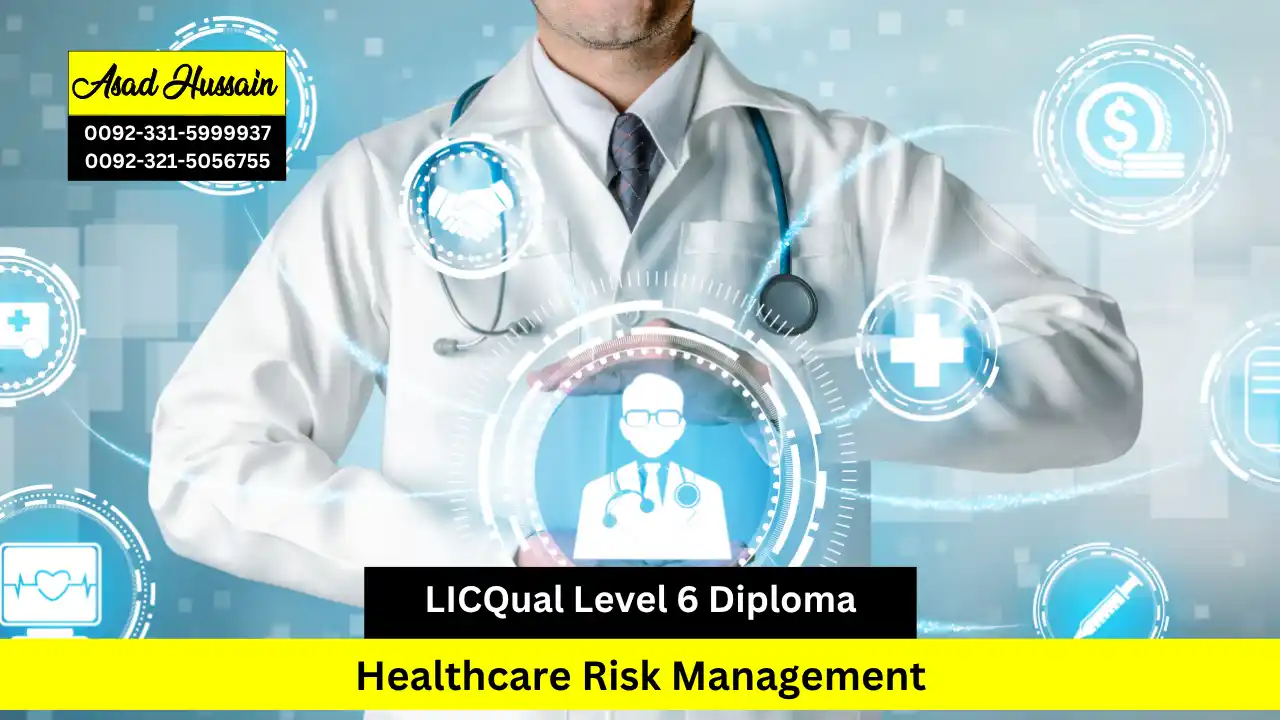The LICQual Level 6 Diploma in Healthcare Risk Management is a globally recognized qualification designed for professionals seeking to develop advanced expertise in identifying, assessing, and mitigating risks within healthcare systems. This course empowers learners to create safer healthcare environments by integrating proactive risk management strategies, ethical leadership, and evidence-based decision-making.
LICQual Level 6 Diploma in Healthcare Risk Management is to equip participants with a deep understanding of risk assessment methodologies, healthcare governance, and quality improvement processes. Learners will explore frameworks that help healthcare institutions anticipate potential threats, minimize adverse events, and foster a culture of safety and accountability. The course blends theoretical foundations with practical applications, ensuring that graduates can confidently implement effective risk management systems in hospitals, clinics, and other healthcare settings.
Through this healthcare risk management diploma, learners will develop the analytical and problem-solving skills necessary to evaluate clinical and operational risks. They will gain the ability to design and monitor risk control measures, conduct root cause analyses, and promote continuous improvement in healthcare quality. The course also emphasizes compliance with international healthcare standards, such as ISO 31000 and ISO 45001, ensuring learners are prepared to operate within both local and global regulatory frameworks.
This program provides practical exposure to real-world healthcare scenarios, allowing participants to apply risk management techniques in diverse clinical and administrative contexts. Learners will understand how to identify potential failures in systems and processes, manage incidents effectively, and design risk communication strategies that enhance transparency and trust. These hands-on skills enable professionals to strengthen their organization’s resilience and safeguard both patients and staff from harm.
The LICQual Level 6 Diploma in Healthcare Risk Management is ideal for healthcare administrators, quality managers, clinical supervisors, and policymakers who aim to improve healthcare safety and efficiency. It also benefits professionals in hospital management, public health, and compliance who wish to enhance their leadership capabilities through advanced risk management training. By mastering risk governance and mitigation principles, graduates will be able to contribute to the strategic goals of healthcare institutions at national and international levels.
Program Highlights
Mandatory Units
- Principles of Healthcare Risk Management
- Risk Assessment and Analysis
- Incident Reporting and Investigation
- Regulatory Compliance and Legal Frameworks
- Crisis Management and Emergency Planning
- Risk Monitoring, Evaluation, and Performance Improvement
The LICQual Level 6 Diploma in Healthcare Risk Management welcomes professionals and aspiring leaders who aim to advance their expertise in healthcare safety, governance, and risk assessment. This qualification is designed for individuals who wish to enhance their analytical, strategic, and compliance skills to effectively manage and mitigate healthcare risks. Meeting the following entry requirements ensures that learners are fully prepared to engage with the academic and professional demands of this internationally recognized program.
Age Requirements
- Applicants must be at least 18 years of age at the time of enrollment.
- Candidates under 18 may be accepted in exceptional cases with verified parental or guardian consent and evidence of academic maturity.
- Learners should demonstrate a commitment to professional growth and readiness for higher-level study in healthcare management and risk assessment.
Educational Requirements
- A high school diploma or an equivalent qualification is required for admission.
- Previous studies in healthcare management, public health, safety management, or business administration are advantageous but not mandatory.
- Applicants should possess a basic understanding of healthcare systems, operations, or risk principles to support their engagement with the course modules.
- Candidates who have completed related qualifications, such as the LICQual Level 5 Diploma in Healthcare Management, are well-prepared for progression to this advanced program.
Professional Experience
- Although not mandatory, 1–2 years of professional experience in healthcare administration, clinical governance, or safety management is highly recommended.
- Individuals with backgrounds in nursing, hospital management, or quality control will benefit from the applied learning approach of this course.
- Professionals currently working in compliance, audit, or healthcare leadership roles can apply risk management principles directly to their organizations.
- Practical exposure to healthcare systems will enhance learners’ ability to apply theoretical concepts to real-world challenges.
English Language Proficiency
- Applicants must have strong English reading, writing, and communication skills to comprehend study materials and complete assessments effectively.
- Learners who have previously studied in English-medium institutions may be exempt from additional English language testing.
- International candidates are required to demonstrate proficiency through recognized qualifications such as IELTS (minimum overall band score of 5.5) or an equivalent certification.
- Effective communication in English is essential for engaging with the academic rigor and professional context of this healthcare risk management course.
Meeting these entry requirements ensures that learners possess the foundational knowledge, language proficiency, and professional readiness necessary to excel in the LICQual Level 6 Diploma in Healthcare Risk Management. This qualification not only strengthens understanding of healthcare safety and compliance but also prepares learners for leadership roles in risk governance and patient safety management. Graduates may also choose to further their studies with advanced programs, such as the LICQual Level 7 Diploma in Healthcare Management and Leadership, to expand their expertise in strategic healthcare operations.e future of patient-centered communication and organizational success.
The LICQual Level 6 Diploma in Healthcare Risk Management is a comprehensive qualification designed to equip healthcare professionals with advanced knowledge and skills in identifying, assessing, and mitigating risks within healthcare settings. The course integrates theoretical understanding with practical applications, focusing on improving patient safety, regulatory compliance, and overall healthcare quality. Learners will gain the ability to implement structured risk management systems, promote a safety culture, and lead organizational strategies to prevent and manage risks effectively.
Principles of Healthcare Risk Management
- Upon completing this unit, learners will be able to explain the core principles and objectives of healthcare risk management and their importance in ensuring patient safety and service quality.
- They will learn to identify various risk types, including clinical, operational, and organizational risks, within healthcare environments. Learners will apply internationally recognized risk management frameworks such as ISO 31000 to healthcare contexts.
- They will also assess the significance of governance, accountability, and ethical leadership in managing healthcare risks and formulate strategies to integrate risk management principles into institutional policies.
Clinical Governance and Patient Safety
- Upon completing this unit, learners will be able to understand the interconnection between clinical governance, patient safety, and healthcare performance. They will identify and analyze safety risks and adverse incidents in clinical practices using root cause analysis and evidence-based methods.
- Learners will design and implement patient safety programs that align with national and global quality standards. They will foster a culture of learning, safety, and transparency within healthcare organizations and develop the leadership capacity to promote patient-centered safety initiatives.
Risk Assessment and Mitigation Strategies in Healthcare
- Upon completing this unit, learners will be able to conduct detailed risk assessments using qualitative and quantitative methods to identify vulnerabilities within healthcare systems. They will evaluate risks based on likelihood and potential impact, prioritizing them for effective management.
- Learners will design and implement mitigation strategies and contingency plans to minimize the occurrence of adverse events. They will continuously monitor and review the success of these strategies and integrate proactive and reactive risk management approaches for sustained improvement.
Legal, Ethical, and Regulatory Aspects of Healthcare Risk Management
- Upon completing this unit, learners will be able to understand the legal, ethical, and regulatory frameworks that guide risk management in healthcare organizations. They will analyze national and international healthcare regulations, accreditation requirements, and professional codes of conduct.
- Learners will address ethical dilemmas such as confidentiality, patient autonomy, and informed consent in the context of healthcare risk. They will develop compliance policies that reflect both legal standards and ethical principles, ensuring accountability and transparency across healthcare services.
Quality Improvement and Risk Communication
- Upon completing this unit, learners will be able to understand the importance of continuous quality improvement in managing healthcare risks. They will apply quality management methodologies such as PDCA and Six Sigma to improve healthcare processes and outcomes.
- Learners will develop effective risk communication strategies that ensure all stakeholders are informed and engaged in safety initiatives. They will create communication frameworks that foster trust, clarity, and collaboration among healthcare professionals, management, and patients, enhancing organizational performance and accountability.
Emergency Preparedness and Crisis Management in Healthcare
- Upon completing this unit, learners will be able to identify potential emergencies and crises that may impact healthcare operations and patient safety. They will design emergency preparedness and disaster response plans that ensure service continuity during critical situations.
- Learners will apply crisis management principles to coordinate effective responses to pandemics, system failures, and natural disasters.
- They will evaluate crisis outcomes and apply lessons learned to strengthen future preparedness frameworks, enhancing resilience within healthcare systems.
The LICQual Level 6 Diploma in Healthcare Risk Management provides learners with the knowledge, skills, and analytical capabilities to lead risk management and safety initiatives in healthcare. Graduates will be equipped to handle complex challenges, implement effective control measures, and ensure compliance with global healthcare standards. This qualification prepares professionals to take leadership roles in healthcare safety, governance, and quality improvement, contributing significantly to safer, more efficient, and ethically responsible healthcare systems worldwide.
The LICQual Level 6 Diploma in Healthcare Risk Management is an internationally recognized qualification designed for healthcare professionals seeking to develop advanced expertise in identifying, assessing, and mitigating risks across healthcare organizations. As global healthcare systems grow increasingly complex, effective risk management has become essential to ensuring patient safety, regulatory compliance, and organizational resilience. This program equips learners with the analytical, strategic, and leadership skills required to manage healthcare risks, enhance service quality, and foster a culture of safety and accountability.
Healthcare Leaders and Managers
• Professionals currently in or aspiring to leadership positions within hospitals, clinics, and healthcare organizations.
• Managers responsible for operational safety, governance, and risk control strategies in healthcare service delivery.
• Individuals aiming to strengthen their ability to make data-driven, ethical decisions that improve patient outcomes and reduce organizational risks.
• Learners focused on integrating risk management frameworks into healthcare operations to promote quality and efficiency.
• Administrators committed to ensuring compliance with international healthcare standards and patient safety protocols.
Healthcare Professionals and Practitioners
• Doctors, nurses, and allied health professionals involved in patient care and safety management within clinical environments.
• Practitioners seeking to apply evidence-based risk assessment methods to minimize clinical and operational hazards.
• Professionals aiming to enhance their knowledge of healthcare regulations, safety audits, and quality improvement systems.
• Clinicians developing strategies to identify early warning signs of risks, prevent adverse events, and improve patient trust.
• Learners striving to advance their professional competence by incorporating proactive risk management in daily healthcare practice.
Risk and Compliance Officers
• Professionals responsible for maintaining healthcare governance, compliance, and safety frameworks within organizations.
• Individuals developing, implementing, and monitoring policies that reduce organizational, clinical, and operational risks.
• Learners specializing in regulatory compliance, internal auditing, and healthcare accreditation standards.
• Managers ensuring adherence to national and international healthcare risk management guidelines.
• Leaders aiming to create and maintain a culture of safety, accountability, and transparency across all healthcare operations.
Policy Makers and Healthcare Administrators
• Policy makers and senior administrators designing healthcare systems that prioritize patient safety and quality assurance.
• Professionals engaged in risk-based healthcare policy planning, implementation, and evaluation.
• Individuals integrating healthcare risk management principles into governance structures and strategic frameworks.
• Administrators managing large-scale healthcare facilities aiming to reduce system-wide risks through data-driven planning.
• Leaders working toward global healthcare improvement by embedding resilience, compliance, and safety into institutional policies.
Supervisors and Departmental Heads
• Supervisors overseeing healthcare teams or departments aiming to enhance performance through effective risk management.
• Departmental heads ensuring adherence to safety protocols, operational standards, and continuous improvement processes.
• Professionals implementing incident reporting systems and conducting root cause analyses to prevent future errors.
• Managers developing leadership skills to guide teams in addressing and mitigating healthcare risks efficiently.
• Leaders promoting collaboration, accountability, and best practices within their departments to strengthen patient safety culture.
Career-Focused Learners and Future Healthcare Risk Managers
• Individuals aspiring to advance their careers in healthcare quality assurance, safety, and risk management roles.
• Learners preparing for senior positions in hospitals, health ministries, NGOs, or healthcare consultancy organizations.
• Professionals seeking career progression in healthcare governance, regulatory affairs, or safety management.
• Career-oriented individuals motivated to implement innovative risk management models and preventive healthcare strategies.
• Learners aiming to become influential leaders capable of shaping safer, more resilient, and patient-centered healthcare systems.
The LICQual Level 6 Diploma in Healthcare Risk Management is ideal for professionals dedicated to promoting safety, quality, and accountability in healthcare delivery. Graduates will gain the expertise to assess and mitigate healthcare risks, ensure regulatory compliance, and lead safety improvement initiatives across organizations. This qualification opens pathways to leadership roles in healthcare quality management, governance, and policy development — empowering professionals to create safer and more effective healthcare environments worldwide.







